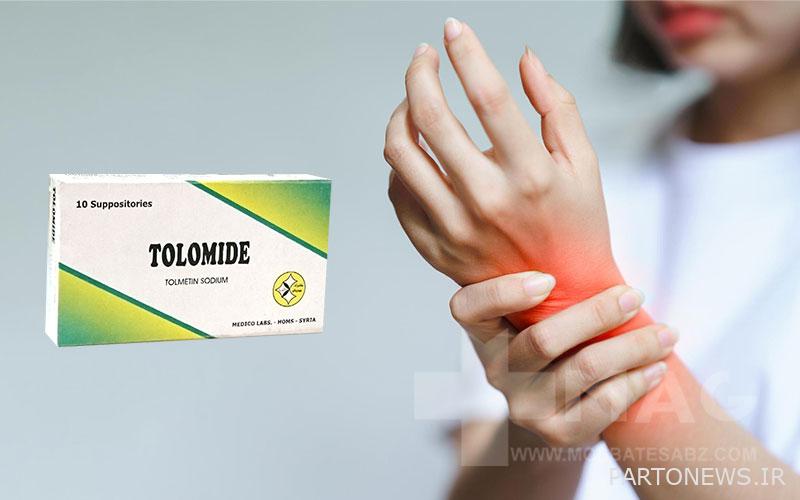What is Tolmetin for?

There are many tools and methods to manage pain and improve people’s quality of life, but the search for better and more efficient solutions in this field continues. One of the important drugs that has been considered as an effective option in pain management is the drug “Tolmetin”. With its mechanism of action, this drug relieves pain, swelling and joint stiffness caused by rheumatoid arthritis and osteoarthritis and is known as a non-steroidal anti-inflammatory drug (NSAID) in the world of medicine and treatment. In this article, we will review the mechanism of action, uses, precautions and contraindications of Tolmetin.
What we read in this article
Pharmaceutical forms of Tolmetin
Tolmetin is available in 200 mg and 600 mg tablets, 400 mg capsules. The drugs of its group include diclofenac, diflunisal, etodolac, fenoprofen, flurbiprofen, ibuprofen, indomethacin, ketoprofen, ketorolac, etc.
Tolmetin uses
Tolmetin is used alone or in combination with other treatments to reduce joint pain, swelling, and stiffness caused by rheumatoid arthritis and osteoarthritis. It is also used for juvenile rheumatoid arthritis. If you are treating a chronic condition such as arthritis, ask your doctor about non-drug treatments or using other medications to treat your pain. Tolmetin is known as a non-steroidal anti-inflammatory drug (NSAID).
Pharmacological effects and mechanism of action of Tolmetin drug
This drug prevents the synthesis of prostaglandins in body tissues by inhibiting at least 2 cyclooxygenase isozymes, cyclooxygenase-1 (COX-1) and -2 (COX-2). It may also inhibit chemotaxis and change the activity of lymphocytes, in some cases it also reduces the activity of pro-inflammatory cytokines and inhibits the accumulation of neutrophils. These effects contribute to its anti-inflammatory activity. The plasma peak time is 30-60 minutes and the concentration is 40 μg/ml. This drug is finally eliminated through urine (almost 100%).
Dosage of Tolmetin
Before using Tolmetin drug, check the drug information on the packaging, including its usage and how to use it. Take this medication by mouth as directed by your doctor, usually 3 times a day with a full glass of water (8 ounces or 240 mL). Do not lie down for at least 10 minutes after taking this medicine. If stomach upset occurs, take this medication with food, milk, or an antacid (except sodium bicarbonate). Dosage is based on medical condition and response to treatment. Also, the dose in children will be determined based on weight.
Time to take Tolmetin tablets
To reduce the risk of stomach bleeding and other side effects, take this medicine with the lowest effective dose and for the shortest possible time. Do not increase, decrease or stop your dose without consulting your doctor. Talk to your doctor or pharmacist about the risks and benefits. Take this medicine regularly to get the most benefit from it. Take it at regular times every day to help you remember. If you take the medicine regularly, you will see its positive effects within one to two weeks.
How to use Tolmetin
- For arthritis relief, 200 to 600 mg orally is used every 8 hours, with a total daily intake not exceeding 1800 mg.
- Rheumatoid arthritis, 200 to 600 mg orally every 8 hours, not to exceed 1,800 mg per day. Also, in adults, drink 8 to 12 ounces of water to avoid digestive effects.
- Juvenile rheumatoid arthritis in children over 2 years old, 20 to 30 mg/kg orally every 6 to 8 hours and a maintenance dose of 15 to 30 mg/kg orally every 6 to 8 hours.
- To reduce pain in children, 20 to 28 mg/kg orally every 6 hours. Also, in children, drink 8 to 12 ounces of water to avoid gastrointestinal side effects.
Precautions
Before taking Tolmetin, if you are allergic to it or aspirin or other NSAIDs (such as ibuprofen, naproxen, zumpirac, celecoxib), avoid taking it. This medicine may contain inactive ingredients that can cause allergic reactions or other problems. People with a medical history such as asthma (including a history of worsening breathing after taking aspirin or other NSAIDs), bleeding or clotting problems, blood disorders (such as anemia), high blood pressure, diabetes, heart disease (such as a history of heart attack ), liver disease, growth in the nose (nasal polyps), obesity, smoking, stomach, intestinal and esophageal problems (bleeding ulcers), gastrointestinal bleeding, reflux disease, etc., use this medicine with caution and consultation with a doctor.
Kidney problems can sometimes occur with the use of NSAIDs, including tolmetin. To prevent dehydration, drink plenty of fluids as directed by your doctor and tell your doctor right away if there is a change in your urine output. The use of this medicine will cause drowsiness and dizziness in some patients, therefore, after taking the medicine, avoid doing things that require high alertness (such as driving, working with machines, working with tools, etc.). Also, daily alcohol and tobacco use, especially when combined with this medication, may increase the risk of stomach bleeding.
Warnings for the use of Tolmetin
- Long-term administration of NSAIDs may lead to renal papillary necrosis and other kidney damage. Patients at greatest risk include the elderly, or those with renal dysfunction, hypovolemia, heart failure, liver dysfunction, salt depletion, and those taking diuretics, ACE inhibitors, or ARBs.
- Strong cross-sensitivity may exist for ASA-allergic patients.
- NSAIDs have the potential to provoke HF by inhibiting prostaglandins, which leads to sodium and water retention, increased systemic vascular resistance, and decreased response to diuretics.
- Use caution in asthma (bronchial), heart disease, CHF, liver failure, HTN, renal failure.
- Note that NSAIDs should be avoided or discontinued if possible.
Contraindications for the use of Tolmetin
- Absolute: ASA allergy, liver disease (severe chronic), hepatitis, jaundice, nursing mother
- Relative: bleeding disorder, duodenal, gastric or peptic ulcer, stomatitis, SLE, ulcerative colitis, upper gastrointestinal disease, late pregnancy (may cause premature closure of ductus arteriosus)
Cardiovascular risk of Tolmetin
- NSAIDs may increase the risk of serious cardiovascular thrombotic events, myocardial infarction (MI), and stroke, which can be fatal.
- Patients with existing or existing cardiovascular risk factors may be at increased risk.
- NSAIDs are contraindicated for postoperative pain during coronary artery bypass graft (CABG) surgery (increased risk of MI and stroke).
Gastrointestinal risk of Tolmetin
- NSAIDs increase the risk of serious gastrointestinal side effects, including bleeding, ulcers, and perforation of the stomach or intestines, which can be fatal.
- GI side effects may occur at any time during use and without warning symptoms. Elderly patients are at increased risk for serious GI events.
The dangers of using Tolmetin
Nonsteroidal anti-inflammatory drugs (including tolamine) may rarely increase the risk of heart attack or stroke. This effect can happen at any time while taking this drug, but is more likely with long-term use. This risk is higher in older people or if you have heart disease or an increased risk of heart disease (for example, due to smoking, a family history of heart disease, or conditions such as high blood pressure or diabetes). It should be noted that you should not take this medicine right before or after heart bypass surgery (CABG).
Also, tolmetin may rarely cause serious (rarely fatal) bleeding from the stomach or intestines. This effect can occur without warning symptoms at any time during the use of this drug. Elderly people may be at greater risk for this effect. If you notice any of these rare but serious side effects, such as chest, jaw, or left arm pain, shortness of breath, unusual sweating, confusion, weakness on one side of the body, difficulty speaking, sudden vision changes, etc., contact your doctor. or talk to your pharmacist about the benefits and risks.
Side effects of Tolmetin
Nausea, vomiting, heartburn, dizziness, drowsiness, diarrhea and headache are some of the side effects of Tolmetin. If any of these effects persist or worsen, tell your doctor or pharmacist right away. Some serious side effects of this drug include fast heartbeat, hearing changes (such as ringing in the ears), mental or behavioral changes, difficult or painful swallowing, easy bruising and bleeding, stiff neck for no reason, signs of kidney problems (such as changes in urine), changes in vision, symptoms of heart failure (such as ankle swelling, unusual fatigue, unusual or sudden weight gain) and…
- Increased liver function test
- nausea
- blood pressure
- Myocardial infarction
- human
- Weight gain, weight loss
- stomach ache
- diarrhea
- Flatulence
- Indigestion
- Nausea, vomiting
- asthenia
- dizziness
- Headache

Tolmetin drug interactions
- Class X interactions (avoid): acemethacin, aminolevulinic acid (systemic), dex ibuprofen, dex ketoprofen, fluctaphenine, ketorolac (systemic and nasal), macimorelin, mifamortide, morniflumate, nonsteroidal anti-inflammatory drugs (COX2 specific), omastaxin, plobiprofen, phenyl Butazone, talniflumate, tenoxicam, urokinase, zaltoprofen
- Tolmetin reduces the effects of drugs: angiotensin-converting enzyme inhibitors, beta-blockers, eplerenone, hydralazine, loop diuretics, macimorelin, mifamortide, potassium-sparing diuretics, prostaglandins (ophthalmic), salicylates, specific serotonin reuptake inhibitors, sincalide, thiazide and thiazide-like diuretics.
- Tolmetin increases the effects of drugs: lithium, metformin, methotrexate, non-steroidal anti-inflammatory drugs (COX2 specific), obinotozumab, omastaxin, porfimer, potassium-sparing diuretics, pralatrexate, quinolones, rivaroxaban, salicylates, tacrolimus (systemic), tenofovir products, aliskiren, Aminoglycosides, aminolevulinic acid (topical and systemic), anticoagulants, apixaban, bemiparin, derivatives of bisphosphonates, cephalothin
- Increased effects of tolmetin by drugs: angiotensin-converting enzyme inhibitors, corticosteroids (systemic), cyclosporine (systemic), dasatinib, dexketoprofen, diclofenac (systemic), fat emulsion (based on fish oil), flavinac, fluctaphenine, glucosamine, herbs (with antiplatelet and anticoagulant), ibrutinib, inotresin, ketorolac (systemic and nasal), limaprost, loop diuretics, morniflumate, multivitamin/fluoride (containing vitamins A, D, E), pentoxifylline, phenylbutazone, probenecid, prostacyclin analogues Norepinephrine/serotonin reuptake inhibitors, sodium phosphate, talniflumate, tenoxicam
Taking Tolmetin tablets during pregnancy and breastfeeding
Tolmetin drug is in group C in terms of risk during pregnancy, that is, it can be used with the consultation and prescription of a doctor. Animal studies in this field have not shown any risk or the risks of using it are low. Also, no specific human studies are available on this drug. The benefits of the drug against possible risks determine the use or non-use of this drug during pregnancy.
Tolmetin storage conditions
Tolmetin should be stored at room temperature and away from light and moisture. All chemical and herbal medicines should be kept out of the reach of animals and children.
The last word about the drug Tolmetin
Nonsteroidal anti-inflammatory drugs (NSAIDs) are a broad and common group of drugs used in the management of various pain and inflammations that have been used for many years. These drugs have anti-inflammatory, analgesic and antipyretic effects and are used in the treatment of problems such as chronic pain, arthritis and inflammation of the joints. Tolmetin drug is one of these drugs that has many risks and side effects along with wide benefits. We have provided you with a full description of this drug in this article from the online positive green pharmacy magazine.
Site source: Medscape

